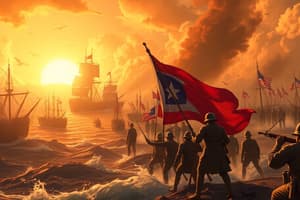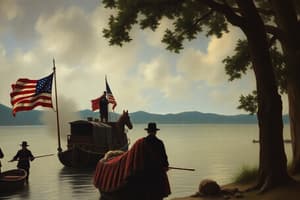Podcast
Questions and Answers
What was one of the main outcomes of the Treaty of Paris in 1898?
What was one of the main outcomes of the Treaty of Paris in 1898?
- Cuba gained independence from Spain
- U.S. gain of Puerto Rico, Guam, and the Philippines (correct)
- Establishment of the League of Nations
- The end of the Spanish-American War
Which argument was made by the Anti-Imperialist League against U.S. imperialism?
Which argument was made by the Anti-Imperialist League against U.S. imperialism?
- Spreading democratic ideals globally
- The need for strategic military bases
- The hypocrisy of denying self-determination (correct)
- Expansion of economic trade opportunities
What significant construction project did the U.S. undertake in Panama?
What significant construction project did the U.S. undertake in Panama?
- Panama Canal (correct)
- Coastal Highway
- Transcontinental Railroad
- Panama Bridge
Which event triggered America's entry into World War I?
Which event triggered America's entry into World War I?
How did World War I influence the role of women in the United States?
How did World War I influence the role of women in the United States?
What was a consequence of the Treaty of Versailles in 1919?
What was a consequence of the Treaty of Versailles in 1919?
What did the 19th Amendment achieve?
What did the 19th Amendment achieve?
Which legal case limited free speech during wartime in the U.S.?
Which legal case limited free speech during wartime in the U.S.?
The Fourteenth Amendment, passed by Congress in 1868, talks about
The Fourteenth Amendment, passed by Congress in 1868, talks about
What was a major reason for immigration to America during the late 19th and early 20th centuries?
What was a major reason for immigration to America during the late 19th and early 20th centuries?
What was one significant impact of the Transcontinental Railroad?
What was one significant impact of the Transcontinental Railroad?
What characterized horizontal integration as practiced by industrialists like Rockefeller?
What characterized horizontal integration as practiced by industrialists like Rockefeller?
Which of the following was a significant issue faced by workers during industrialization?
Which of the following was a significant issue faced by workers during industrialization?
What was a negative impact of political machines on American society?
What was a negative impact of political machines on American society?
Which of the following was a goal of the Populist Party?
Which of the following was a goal of the Populist Party?
Who was the key figure associated with the Populist Party, known for his 'Cross of Gold' speech?
Who was the key figure associated with the Populist Party, known for his 'Cross of Gold' speech?
What was the primary concern highlighted by muckrakers like Upton Sinclair?
What was the primary concern highlighted by muckrakers like Upton Sinclair?
Flashcards
What were the key causes of the Spanish-American War?
What were the key causes of the Spanish-American War?
The sinking of the USS Maine, yellow journalism, and America's ambition to liberate Cuba from Spanish governance were the driving forces behind the US entering the Spanish-American War.
What were the consequences of the Spanish-American War?
What were the consequences of the Spanish-American War?
The Treaty of Paris, signed in 1898, marked the end of the Spanish-American War. It resulted in the US gaining control of Puerto Rico, Guam, and the Philippines, signifying the start of American imperialism.
What were some arguments against America's new colonies?
What were some arguments against America's new colonies?
The Anti-Imperialist League, spearheaded by Mark Twain, opposed the expansion of American colonies. They argued that it was against the principles of self-determination and ethical to oppress nations.
What is the significance of the Panama Canal?
What is the significance of the Panama Canal?
Signup and view all the flashcards
Why did the US enter World War I?
Why did the US enter World War I?
Signup and view all the flashcards
How did WWI impact different groups?
How did WWI impact different groups?
Signup and view all the flashcards
What is the 19th Amendment and its connection to WWI?
What is the 19th Amendment and its connection to WWI?
Signup and view all the flashcards
What were the key developments related to free speech and labor during WWI?
What were the key developments related to free speech and labor during WWI?
Signup and view all the flashcards
Reasons for Immigration to America
Reasons for Immigration to America
Signup and view all the flashcards
Ellis Island vs. Angel Island
Ellis Island vs. Angel Island
Signup and view all the flashcards
Transcontinental Railroad Impact
Transcontinental Railroad Impact
Signup and view all the flashcards
Horizontal & Vertical Integration
Horizontal & Vertical Integration
Signup and view all the flashcards
Robber Barons vs. Captains of Industry
Robber Barons vs. Captains of Industry
Signup and view all the flashcards
Worker's Rights and Strikes
Worker's Rights and Strikes
Signup and view all the flashcards
Political Machines and Corruption
Political Machines and Corruption
Signup and view all the flashcards
Populist Party and Farmers' Struggles
Populist Party and Farmers' Struggles
Signup and view all the flashcards
Study Notes
Spanish-American War and Empire Building
- The Spanish-American War started due to the sinking of the USS Maine, yellow journalism, and America's desire to liberate Cuba.
- The Treaty of Paris (1898) granted the U.S. control over Puerto Rico, Guam, and the Philippines, marking the beginning of American imperialism.
Controversy Over New Colonies
- Arguments for imperialism included economic benefits (trade, resources); strategic military bases; and the "White Man's Burden" to spread democracy.
- Opponents, like Mark Twain, argued that acquiring colonies was hypocritical and ethically problematic, violating the principle of self-determination.
America's Role in Panama
- The U.S. supported Panama's independence from Colombia to build the Panama Canal, connecting the Atlantic and Pacific Oceans.
- This demonstrated American global influence but involved controversial interventionism.
America's Role as a Superpower
- Colonial rule in the Philippines was harsh, leading to conflict (Philippine-American War).
- Limited self-rule was granted in Puerto Rico.
- Involvement in the Spanish-American War and WWI showcased America's complicated balance between freedom ideals and imperialistic actions.
Reasons for America Entering WWI
- Germany's unrestricted submarine warfare, including the sinking of the Lusitania, and the Zimmerman Telegram (proposal to Mexico) contributed.
- Economic ties to the Allies (trade and loans) also played a role.
- U.S. officially declared war on April 6, 1917.
Impact of WWI on Different Groups
- Women: Took on male-dominated jobs, stimulating the suffrage movement.
- African Americans: Migrated north for war jobs, facing discrimination but contributing to segregated units.
- Propaganda: Encouraged patriotism, and war support.
- Immigrants: Experienced suspicion and anti-German sentiment.
- Anti-War Movements: Dissent was suppressed by the Espionage and Sedition Acts.
How WWI Ended and Its Impact
- WWI ended with an armistice on November 11, 1918.
- The Treaty of Versailles held Germany responsible and imposed reparations.
- The League of Nations was proposed (but the U.S. did not join), and unresolved tensions helped set the stage for WWII.
19th Amendment
- Granted women the right to vote in 1920.
- Women's wartime contributions influenced public opinion.
Schenck v. U.S. and Labor During the War
- Schenck v. U.S. (1919) upheld the Espionage Act, limiting free speech during wartime if it posed a "clear and present danger."
- Wartime production increased demand for workers, resulting in shifts in labor demographics, with women and minorities filling new roles.
Immigrant Life in America
- Reasons for immigration: Famine, persecution, poverty, and seeking opportunity.
- Challenges faced: Language barriers, overcrowded tenements, poor working conditions, discrimination (e.g., nativism), and differing experiences at entry points.
- Key entry points like Ellis Island (Europeans primarily) and Angel Island (Asians primarily) differed in processing and treatment.
Transcontinental Railroad & Chinese Discrimination
- Impact of the railroad: Connected the country, boosted trade, and allowed westward expansion.
- Discrimination: Chinese workers, crucial to railroad construction, were paid less, faced dangerous conditions, and experienced violence.
- Chinese Exclusion Act (1882): Banned Chinese laborers; limited rights and family unification.
Industrialization and Monopolies
- Horizontal Integration: Buying out competitors (e.g., Rockefeller and Standard Oil).
- Vertical Integration: Controlling all production stages (e.g., Carnegie and U.S. Steel).
- Robber Barons: Greedy industrialists exploiting workers (e.g., Rockefeller).
- Captains of Industry: Visionary leaders improving society (e.g., Carnegie’s philanthropy).
Worker Problems
- Issues faced: Long hours, low wages, dangerous conditions, and child labor.
- Unions: Knights of Labor, American Federation of Labor (AFL).
- Strikes: Homestead Strike, Pullman Strike.
Political Machines
- Good impacts: Provided jobs, infrastructure, and helped immigrants.
- Bad impacts: Corruption, bribery, and election manipulation (e.g., Tammany Hall and Boss Tweed).
Populist Party & Farmers
- Farmer struggles: Debt, railroad overcharges, and crop price deflation.
- Populist goals: Regulation of railroads, free silver, and fair labor laws.
- William Jennings Bryan: Key figure (Cross of Gold speech).
Muckrakers and Reforms
- Key muckrakers:
- Upton Sinclair: The Jungle (meatpacking horrors).
- Jacob Riis: How the Other Half Lives (urban poverty).
- Ida Tarbell: Exposed Standard Oil abuses.
- Impact: Sparked public demand for reforms.
Progress of the Progressive Era
- Laws passed: Meat Inspection Act, Pure Food and Drug Act.
- Presidential action: Roosevelt’s trust-busting and conservation efforts.
- Social improvements: Women’s suffrage, urban sanitation, and education reforms.
Civil Rights Issues and Leaders
- Leaders:
- Booker T. Washington: Advocated vocational education and gradual change.
- W.E.B. Du Bois: Demanded immediate equality, co-founded NAACP.
- Issues: Segregation (Jim Crow laws), lynching, disenfranchisement.
Urbanization Problems
- Challenges: Overcrowding, poor sanitation, crime, and fire hazards.
- Reforms: Settlement houses (e.g., Hull House by Jane Addams), city planning efforts.
Studying That Suits You
Use AI to generate personalized quizzes and flashcards to suit your learning preferences.
Description
Explore the key events and controversies surrounding the Spanish-American War and America's rise as an imperial power. This quiz covers the motivations for imperialism, opposition arguments, and America's strategic actions in places like Panama. Test your knowledge on how these events shaped the United States' role on the global stage.




